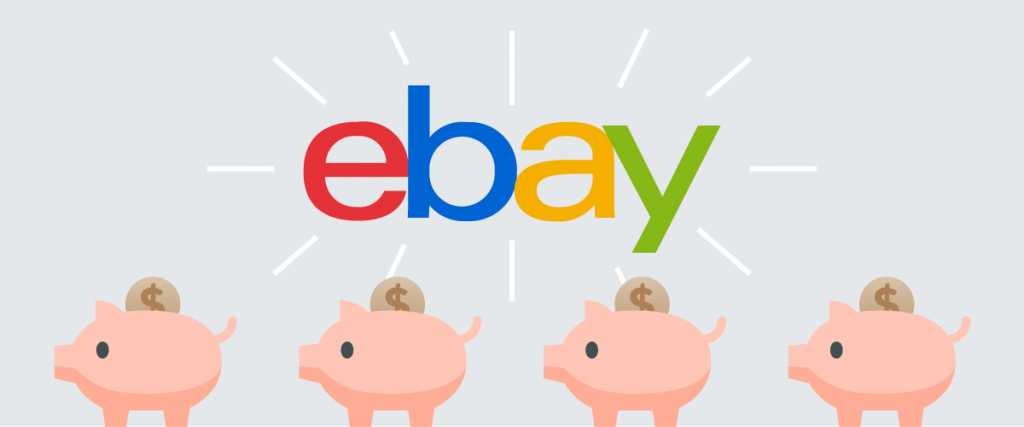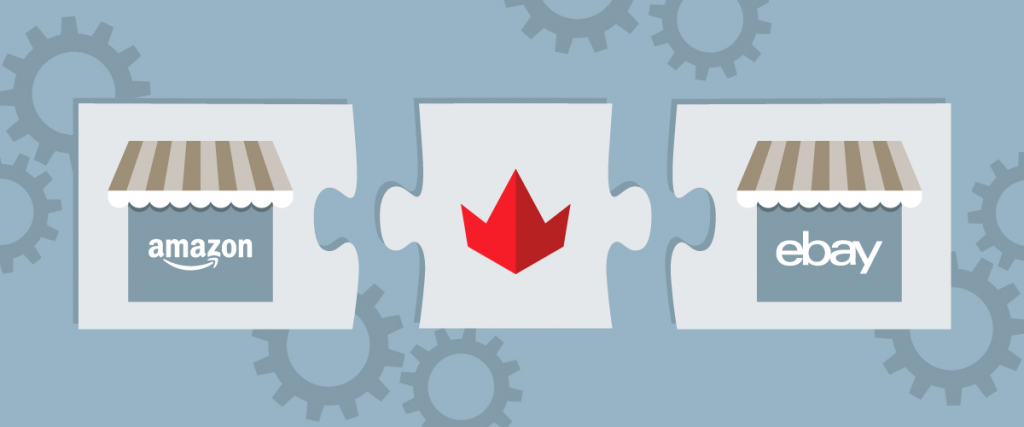Amazon and eBay are the largest and oldest online marketplaces and among the available ecommerce platforms, they are the most similar. They are the equivalent of online supermarkets which stock your items, while other platforms, such as Shopify, are more like individual stores. You might sell your items on Amazon or eBay in addition to your own online store, so using these platforms could also be part of a larger strategy for your business.
In this post, we’ll be comparing the following aspects of Amazon and eBay:
How They Work
Once you sign up for either Amazon or eBay you can create listings for the products you want to sell. Your listings are then searchable in the platform’s catalogue.
Amazon FBA
While there are several ways to make money on Amazon, the most common is to use Fulfillment by Amazon (FBA). With this option, you send your products to an Amazon Fulfillment Center. Once your products are sold, Amazon will pack and ship them for you.
Signing up for this service adds the “Fulfillment by Amazon” badge to your listings and enables shipping with Amazon Prime for certain products. This makes your products more enticing to customers as it assures prompt delivery and your products may qualify for free shipping.
You can also be a third party seller on Amazon and handle your own fulfillment. The choice you make depends on your business, but if the majority of your sales are going to be through Amazon, FBA is likely your best bet.
eBay Auctioning
In addition to listing items for a set price like Amazon, eBay is famous for its ability to auction items. Nowadays auctioning is less common on eBay, as most buyers want their products as soon as possible. This has prompted eBay to encourage sellers to switch to a fixed price model.
However, if you’re selling items that are rare or collectible auctioning may still be your ideal method of sale. In this case, eBay is an obvious choice.
Pricing
Amazon Pricing: Monthly Plans
To get started with Amazon, you will need to sign up for an Amazon selling plan. There are two different options:
- Individual plan: This plan offers Amazon customer service and sales to anywhere in Canada, the U.S. and Mexico. It takes a flat-rate fee of $1.49 CAD from every sale.
- Professional plan: This offers everything in the individual plan plus a number of additional options. For a rate of $29.99/month CAD you will receive better placement in searches and access to promotion codes.
However, you should be aware of the fees that Amazon charges on top of these monthly plans:
- Referral fees: Amazon will charge a percentage of the total sale price or the typical minimum of $0.40 CAD, whichever is greater. The total sale price will include shipping but not sales tax.
- Closing fees: Media items such as books, DVDs, or music are not charged a referral fee but are charged a closing fee of $1.00 CAD/item.
- There are also additional fees for FBA as well as high volume fees and other exceptions.
eBay Pricing: Fees Per Listing and Sale
eBay’s pricing is more complex and depends on the item your are selling. Essentially you pay two fees:
- Insertion fee: Each time you add a listing to eBay this fee will apply. For most product categories the first fifty insertions are free and after this each insertion is $0.30 CAD.
- Final value fee: Once your item is sold, eBay charges you a percentage of the total amount of the sale (around 10% with a maximum fee of $750.00 CAD.)
The fee structure can become more complex if you decide to set up a branded eBay store for an additional subscription fee. This will reduce the cost of your insertion and final value fees. However, these fees depend on the products you are selling.

Which platform has the lowest fees?
In most cases, and especially for small businesses, eBay has lower fees.
Sales and Conversions
As a business, you want to sell more by maximizing the traffic to your products. When it comes to online visitors, Amazon had nearly twice as many visitors than eBay in 2018, so this seems like an easy win.
Whether this will translate into increased traffic for you, however, is not as straightforward. In order to take advantage of Amazon’s visitors, you’ll need to rank well in Amazon’s internal search. So if you are in a competitive industry, ranking well may be difficult.
You can imagine Amazon like a mall, while eBay is more like a fleamarket, with deals and odd items for sale. As the two sites attract a different clientele, you may get more useful traffic from eBay depending on the nature of your business.
Where Amazon shines is in its customer-centric approach. Amazon Prime customers get free and fast delivery, in addition to other perks. This has resulted in conversion rates of 74% compared to an average of 13% for non-prime sales. So while you may not be guaranteed more traffic, the traffic you do receive is likely to convert into sales at a far higher rate.
If your products qualify for Prime, this is a clear advantage. But even if you don’t, Amazon’s average conversion rate of 13% is far higher than the online sales average of 3.32%. And as the Amazon brand increases user trust, selling on Amazon could mean more sales for your business.

Which maximizes your sales?
Amazon is the clear winner, especially if you can leverage Amazon Prime and FBA.
Additional Considerations
There a couple other factors that may affect your decision on eBay vs Amazon.
Amazon controls nearly half of all online sales, which makes it a powerful platform to sell your products. But the strength of this near monopoly can come at a price for small businesses. Amazon will often undercut third party sellers on its platform if it thinks it can compete in their space. Of course, since many people shop on Amazon, you may not have a choice depending on the products you sell.
Amazon also does not accept PayPal, while this is the main method of payment for eBay.
eBay vs Amazon: Which Is the Best?
So what’s our final conclusion on eBay vs Amazon? eBay may be your best option if:
- You are selling rare or collectible items
- Low fees are your priority
- You only sell a limited number of items per month
- Auctioning is important for your business
- You want to use PayPal
Otherwise, for most small businesses Amazon is your best choice.
While its fees may be higher, Amazon Prime make shipping easier and cheaper than eBay, which results in more happy customers. In addition, its FBA service can make fulfillment easier for you while also increasing potential customers’ trust in your product.
Amazon’s customer-centric brand has made it the dominant online marketplace for a reason, even though this success has created problems for third party sellers. For most small businesses trying to choose between Amazon and eBay, Amazon is a clear choice.
Start saving with Chit Chats today!
No hidden monthly fees. Unbeatable prices. More than 20 million packages delivered.

